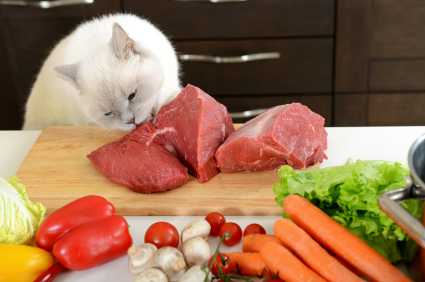Pet foods don’t give your animals all the nutrition they need! How do I know this? As a veterinary technician, I meet with hundreds of experienced veterinarians in Colorado and throughout the country. Most of them tell me they’re encountering more cases of allergies, GI problems, and cancer today than they did 20 years ago. Could this be due to the environment our pets live in? Stress? Genetics? Or is it a lack of nutrition?
Studies show that pets fed on poor diets, even on so-called “complete and balanced” diets, will most likely contract major diseases like cancer, arthritis, allergies, or circulation problems over time. A revealing illustration of the effects of malnutrition on animals can be found in Dr. Francis M. Pottenger’s book, Pottenger’s Cats: A Study in Nutrition.
If we don’t want to lead our pets to an early death, it’s fundamentally important to keep foods of poor quality out of their diets. While there are many types of dog and cat foods available on the market today, choosing wisely is the key to a happy, healthy pet. Bestselling brands rely on mass marketing and creative packaging to make us believe their food will meet all of our pets’ nutritional needs. But most processed pet foods fall far short of this goal, and the nutritional value they offer is marginal at best. In fact, though the industry claims they are highly regulated, a host of medical problems can be linked back to recalled products.
Fortunately, we can fill the nutritional gap in our pets’ diets by giving them whole food supplements from Standard Process and putting them on a raw food diet like the one found in Natural Nutrition for Dogs and Cats: The Ultimate Diet.
Also, we can better understand the kind of food our pets need by looking back at how dogs and cats evolved—mainly as hunters and scavengers. For example, when a lion makes a kill in the wild, he devours the key nutrients found in the organs and glands, including viscera such as the kidneys, the liver, and the adrenals. Sadly, most pet owners don’t understand this. They feed their cats and dogs the same nutrient-poor pet food over and over, depriving them of these basic nutrients. That’s the equivalent of you or me eating macaroni and cheese for the rest of our lives. No variation, no nutritional value. Chances are excellent that any pet who must endure dietary deficiency this extreme will ultimately develop some type of illness or disorder.
The old truism You get what you pay for should be kept in mind when shopping for pet food. The top three brands I recommend are Taste of the Wild, Merrick, and Orijen. But whatever you choose, make sure it’s a well-known brand that’s free of grains, which dogs and cats cannot digest. Pets forced to eat foods so at odds with their natural diets can develop allergies and severe digestion problems.
Providing your animal with adequate nutrition requires more effort than pouring some kibble in a bowl. A well-balanced diet consists of 50 percent grain-free kibble, 50 percent raw food such as liver, kidney, muscle meat, fish, bones, raw eggs, vegetables, apples or other fruit, plus some raw milk dairy, and daily supplementation. The supplement I give my pets, and also recommend to my clients, is Standard Process Canine Whole Body Support and Feline Whole Body Support. Standard Process Veterinary Formulas help bridge the nutritional gap in your pet’s diet; the supplements are made from whole food ingredients your cat or dog would instinctively eat. These products also deliver a full spectrum of nourishment in its natural form and provide your pet with an essential source of complex nutrients.
Our pets are always there for us. They wake us in the morning and greet us when we come home at night. In return for their unconditional love, we should strive to give them a long, happy, and healthy life. And one of the best ways of doing that is to give them the nutrition they both need and deserve.
Photos from iStock/Quasarphoto (dog) and elenaleonova (cat)



